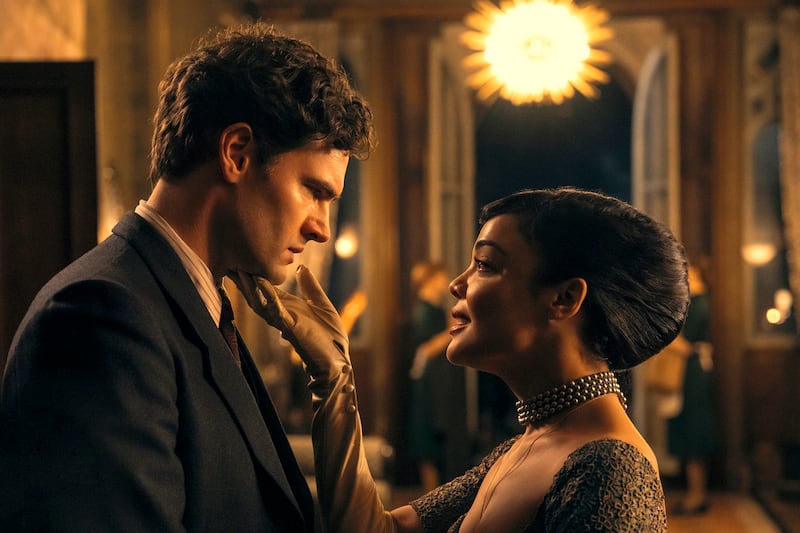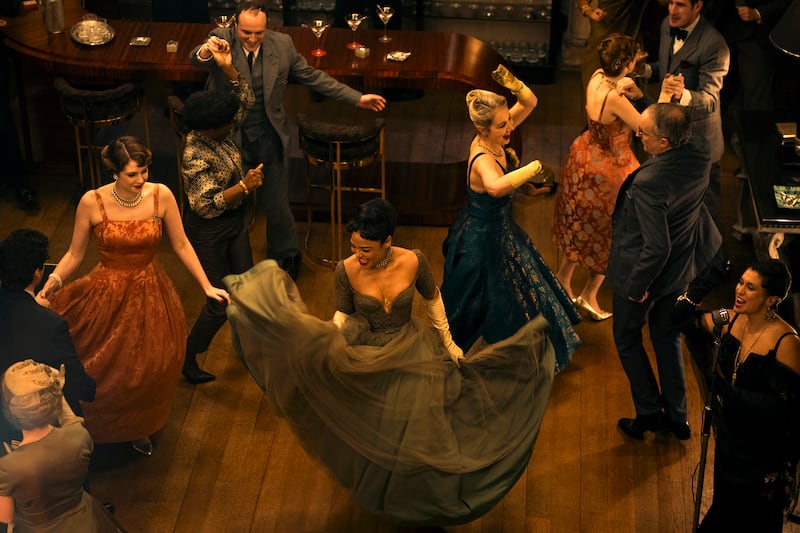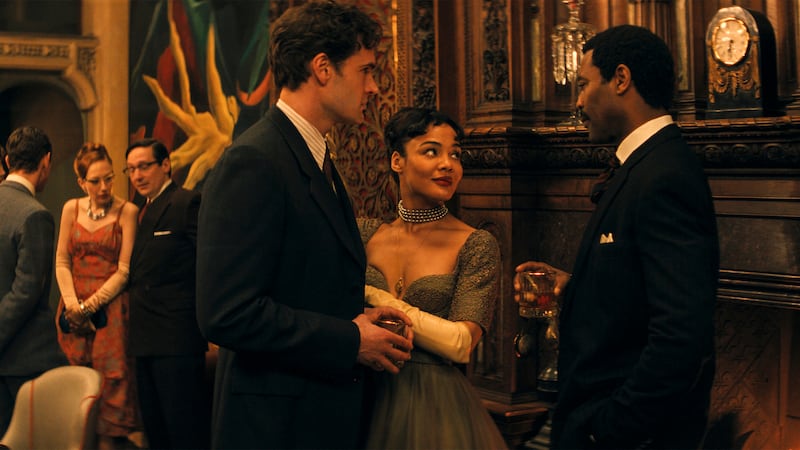With a mischievous glean in her eye that suggests she delights in twisting people into knots, Hedda Gabler (Tessa Thompson) is a woman not to be trifled with in Hedda, Nia DaCosta’s electrically sensual and sinister adaptation of Henrik Ibsen’s acclaimed 1891 play.
From the first sight of her humoring detectives’ questions about murder while casually handling a cigarette, Thompson’s protagonist is a creature of imposing poise, cunning, and arrogance, and she proves to be the blazing star at the center of this highly charged tale of manipulation, desire, and despair. Even at its stagiest, it’s a film that, courtesy of both its director and star, burns with unbridled passions.
Hedda (Oct. 22 in theaters; Oct. 29 on Prime Video) relocates its action to an opulent 1950s English manor house purchased by academic George (Tom Bateman) for his wife Hedda, who’ll later admit that this was the byproduct of her praising the abode on a “whim.”
Whimsicality is Hedda’s stock and trade, or so she claims, although there’s always purpose lurking just beneath the surface of her inviting glances, offhand remarks, and casual gestures, and in arguably the finest performance of her career, Thompson embodies the legendary character with a composure that’s at once alluring and intimidating.
Hedda is hosting a lavish party that her husband says is for her but which, in truth, mainly revolves around his plan to charm Professor Greenwood (Finbar Lynch), who’s the key to securing a professorship that will enable him to support his wife and their extravagant home. All the while, Hedda oversees preparations with an imperious air that, behind her back, earns her eye rolls and scoffs from her sole staff maid, Bertie (Kathryn Hunter). Despite her serenity, however, all is not calm with Hedda, who on the eve of this shindig is seen emerging from the property’s lake, rocks falling out of her gown—a sign that her anguish is more pronounced than is indicated by her façade.
What halts this suicide is a call from Eileen Lovborg (Nina Hoss), whom Hedda invites to the evening’s festivities out of sentimentality for their “good old days.” Hedda’s main alteration to its source is gender-swapping Eileen and, consequently, turning the story’s sexual dynamics sapphic.

Yet neither change—nor the fact that Thompson’s Hedda is Black, making her an even greater high-society outsider—fundamentally alters the material, whose core remains Hedda’s dissatisfaction with her circumstances, and the regrets, jealousies, and anger that motivate her to chart her fateful course later that night, when she lords over the party like a grand dame intent on wreaking mayhem for her own delight.
Hedda has no shortage of shots to do just that, given that Judge Roland Brack (Nicholas Pinnock), who helped finalize the manor house’s acquisition, isn’t shy about his carnal intentions—which Hedda, without hiding it from George, encourages. In case Hedda’s demeanor and behavior weren’t clues enough to her potential lethality, she greets Roland’s arrival by firing a gun in his direction (for fun), and later looks over her prized pistols, which are cherished gifts from her doting father.
Thompson oozes sly menace, conveying that Hedda is happiest when controlling and exploiting people and situations, and the more chaos that ensues, the better. Thus, despite her initially warm treatment of Thea Clifton (Imogen Poots), Eileen’s new girlfriend, her smiles and words are laced with arsenic, and that only escalates once she hears that the duo have completed work on a manuscript destined to snag Eileen the professor gig coveted by George.
Following its protagonist as she slowly weaves a web designed to entrap (and destroy) all, Hedda slinks and slithers about its single sumptuous setting. DaCosta’s widescreen imagery is as ravishing as her camerawork is serpentine, and both infuse the film with volatile eroticism. Be it the lens flares which bifurcate the screen (often in a manner that figuratively decapitates subjects), or the heavy erogenous breaths that overwhelm the soundtrack whenever Hedda is orchestrating her “game,” the director’s aesthetics are enticingly evocative, keeping the material silky and aroused as the host warps things to her benefit.

Hedda truly takes off with the arrival of Eileen, with whom Hedda has a romantic past, and whose ambitions are complicated by her alcoholism (which Hedda uses to her advantage) and, more pressingly, by her status as an out-and-proud lesbian striving to make it in a chauvinistic man’s world.
Hoss’ performance beautifully expresses Eileen’s mixture of brash defiance, tender longing, and deep-seated fears—of failure; of abandonment; of suffering for the sin of living freely—and the proceedings’ finest scenes are those in which she and Hedda wrestle with their individual and shared hang-ups. Disappointment, resentment, doubt, self-recrimination, and heartache color their rapport, and they ultimately provide the fuel for Hedda’s “fire,” which is further stoked by her hunger for both vengeance (against Eileen and Thea) and for wealth, comfort, and status (via George attaining his sought-after position).

Whether she’s setting Eileen’s friend David (Jamael Westman) after Professor Greenwood’s wife Tabitha (Mirren Mack) or inspiring the revelers to enjoy a late-night swim—the latter giving her a chance to pilfer Eileen’s manuscript—Hedda is a Machiavellian force of nature, and DaCosta shrewdly casts her wickedness as a manifestation of urges and impulses that are simultaneously understandable and inscrutable.
For all her evident discontent, bitterness, and covetousness, Thompson’s Hedda has a dark, mysterious heart, one that beats most vigorously during those moments when she’s sowing seeds of destruction. Neither celebrating nor condemning her, Hedda considers her twisted actions and reactions, her internal compulsions and external scheming, with equal parts spellbound fascination, awe, and horror.
DaCosta doesn’t radically alter Ibsen’s narrative course, whose destination is betrayal and violence, and yet she delivers new wrinkles that complicate, to the end, one’s feelings about her devious center of attention.
For the filmmaker, it’s an accomplished and bracing return to form following the misstep that was 2023’s The Marvels. And for its headliner, who’s likewise spent time playing big-screen superheroes, it’s a dazzling turn on par with her stellar work in 2021’s Passing—implying that period pieces are far better suited to her (and DaCosta’s) talents than the opportunities granted by the Marvel movie machine.
The post Tessa Thompson Storms Into the Oscar Race With ‘Hedda’ appeared first on The Daily Beast.




